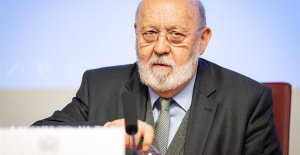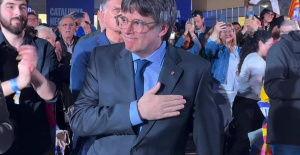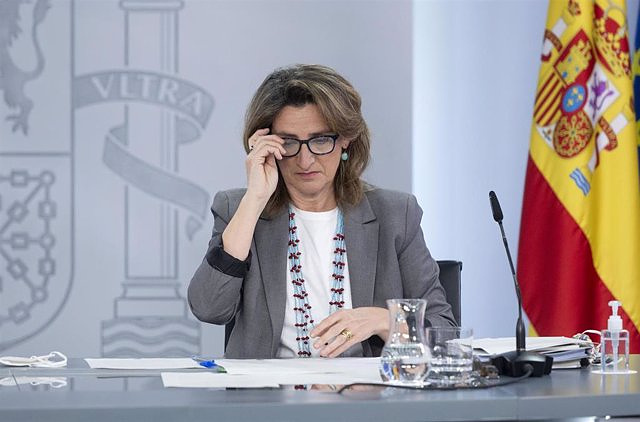He points out that some aid to lower the electricity bill "has lost meaning" and others must be maintained
MADRID, 8 Dic. (EUROPA PRESS) -
The third vice president and minister for the Ecological Transition and Demographic Challenge, Teresa Ribera, has explained that the tax on the profits of energy companies was designed at an "extraordinary" moment and may currently "not meet the requirements" to be permanent, which is why he advocates for its reform.
"This is no longer a one-off solution, but rather something that is designed to last longer over time," Ribera said in statements to Cadena SER reported by Europa Press. Ribera's words align with those of the President of the Government, Pedro Sánchez, who confirmed that he is working on the "redesign" of the tribute.
Of course, the minister has asserted that at no time has she heard anyone say that the tax is going to be eliminated. "I haven't talked about removing anything, I've talked about doing things right," Ribera clarified.
The current tax is levied at 1.2% on the turnover obtained in those companies with income exceeding 1,000 million euros, excluding regulated businesses and activities outside of Spain and extra-peninsular areas. The agreement between PSOE and Sumar to form a Government included the extension of the extraordinary tax for energy companies and banks, valid for this year and the next.
The vice president has defended that it is necessary to study how to adapt a tax that was designed taking as a reference the extraordinary profits of these companies at a time when they increased considerably due to the rise in energy prices.
In addition, Ribera points out, we must also put into the equation the transformation of the energy system and the energy transition, which will require a "massive" investment in the coming years in networks, electrification, efficiency or renewable energies.
"I believe that our commitment is to be equitable in that whoever has more can contribute more and ensure the key economic, ecological and social policy objective, which is that a part of the private sector's resources be dedicated to facilitating that transition," has apostilled
Another issue on which the vice president has spoken is whether the Government is going to extend the energy aid that has been approved in the last year in the anti-crisis decrees to lower the energy bill, as is the case of the VAT on electricity.
In this regard, the Minister for the Ecological Transition has said that her department and the rest of the Executive are working to see which consumer protection measures should be extended and which should not.
Among these aids are the reduction of VAT on electricity bills from 10% to 5% applied to consumers, companies or individuals, with a contracted power of up to 10 kilowatts and the application of the tax rate of 0.5% of the Tax. Special on Electricity.
"Some have lost meaning and others must be maintained and we must see under what conditions. In the coming days and weeks we will see what this Government's decision is," Ribera concluded.

 Exploring Cardano: Inner Workings and Advantages of this Cryptocurrency
Exploring Cardano: Inner Workings and Advantages of this Cryptocurrency Seville.- Economy.- Innova.- STSA inaugurates its new painting and sealing hangar in San Pablo, for 18 million
Seville.- Economy.- Innova.- STSA inaugurates its new painting and sealing hangar in San Pablo, for 18 million Innova.- More than 300 volunteers join the Andalucía Compromiso Digital network in one month to facilitate access to ICT
Innova.- More than 300 volunteers join the Andalucía Compromiso Digital network in one month to facilitate access to ICT Innova.-AMP.- Ayesa acquires 51% of Sadiel, which will create new technological engineering products and expand markets
Innova.-AMP.- Ayesa acquires 51% of Sadiel, which will create new technological engineering products and expand markets The PP sees the concentration of support for Sánchez in Ferraz as a "failure" and believes that it "complicates" the story of its continuity
The PP sees the concentration of support for Sánchez in Ferraz as a "failure" and believes that it "complicates" the story of its continuity Marc Márquez returns to pole in Jerez
Marc Márquez returns to pole in Jerez The CIS carries out a quick survey on Sánchez's letter to measure the reaction of citizens
The CIS carries out a quick survey on Sánchez's letter to measure the reaction of citizens 12M.- Puigdemont to Sánchez and Illa: "This is not about the future of the PSOE! What have you believed?"
12M.- Puigdemont to Sánchez and Illa: "This is not about the future of the PSOE! What have you believed?" How Blockchain in being used to shape the future
How Blockchain in being used to shape the future Not just BTC and ETH: Here Are Some More Interesting Coins Worth Focusing on
Not just BTC and ETH: Here Are Some More Interesting Coins Worth Focusing on UPV students build a prototype of a wooden house to move to Equatorial Guinea
UPV students build a prototype of a wooden house to move to Equatorial Guinea The UA opens the call for the Impulso 2024 Awards for the best innovative business initiatives
The UA opens the call for the Impulso 2024 Awards for the best innovative business initiatives ALI, virtual assistant from Alicante, internationally recognized by the OECD
ALI, virtual assistant from Alicante, internationally recognized by the OECD Retrópolis brings the golden age of video games and computing to the UPV
Retrópolis brings the golden age of video games and computing to the UPV A million people demonstrate in France against Macron's pension reform
A million people demonstrate in France against Macron's pension reform Russia launches several missiles against "critical infrastructure" in the city of Zaporizhia
Russia launches several missiles against "critical infrastructure" in the city of Zaporizhia A "procession" remembers the dead of the Calabria shipwreck as bodies continue to wash up on the shore
A "procession" remembers the dead of the Calabria shipwreck as bodies continue to wash up on the shore Prison sentences handed down for three prominent Hong Kong pro-democracy activists
Prison sentences handed down for three prominent Hong Kong pro-democracy activists ETH continues to leave trading platforms, Ethereum balance on exchanges lowest in 3 years
ETH continues to leave trading platforms, Ethereum balance on exchanges lowest in 3 years Investors invest $450 million in Consensys, Ethereum incubator now valued at $7 billion
Investors invest $450 million in Consensys, Ethereum incubator now valued at $7 billion Alchemy Integrates Ethereum L2 Product Starknet to Enhance Web3 Scalability at a Price 100x Lower Than L1 Fees
Alchemy Integrates Ethereum L2 Product Starknet to Enhance Web3 Scalability at a Price 100x Lower Than L1 Fees Mining Report: Bitcoin's Electricity Consumption Declines by 25% in Q1 2022
Mining Report: Bitcoin's Electricity Consumption Declines by 25% in Q1 2022 Oil-to-Bitcoin Mining Firm Crusoe Energy Systems Raised $505 Million
Oil-to-Bitcoin Mining Firm Crusoe Energy Systems Raised $505 Million Microbt reveals the latest Bitcoin mining rigs -- Machines produce up to 126 TH/s with custom 5nm chip design
Microbt reveals the latest Bitcoin mining rigs -- Machines produce up to 126 TH/s with custom 5nm chip design Bitcoin's Mining Difficulty Hits a Lifetime High, With More Than 90% of BTC Supply Issued
Bitcoin's Mining Difficulty Hits a Lifetime High, With More Than 90% of BTC Supply Issued The Biggest Movers are Near, EOS, and RUNE during Friday's Selloff
The Biggest Movers are Near, EOS, and RUNE during Friday's Selloff Global Markets Spooked by a Hawkish Fed and Covid, Stocks and Crypto Gain After Musk Buys Twitter
Global Markets Spooked by a Hawkish Fed and Covid, Stocks and Crypto Gain After Musk Buys Twitter Bitso to offset carbon emissions from the Trading Platform's ERC20, ETH, and BTC Transactions
Bitso to offset carbon emissions from the Trading Platform's ERC20, ETH, and BTC Transactions Draftkings Announces 2022 College Hoops NFT Selection for March Madness
Draftkings Announces 2022 College Hoops NFT Selection for March Madness























